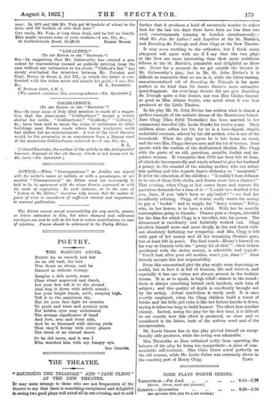THE THEATRE.
4" ROUNDING THE TRIANGLE" AND "JANE CLEGG " AT THE NEW THEATRE.
X'r may seem strange to those who are not frequenters of the theatre to say that there is something exceptional and delightful in seeing two good plays well acted all in one evening, and to add
further that it produces a kind of awestruck wonder to reflect that for the last ten days there have been no less than two such entertainments running in London simultaneously— Shall We Join. the Ladies ? and Loyalties at the St. Martin's, and Rounding the Triangle and Jane Clegg at the New Theatre.
It may seem startling to the orthodox, but I think many playgoers will agree with me if X say that the two plays at the New are more interesting than their more ambitious fellows at the St. Martin's, admirable and delightful as those are. Never for a moment do we get outside the theatre in Mr. Galsworthy's play, but in Mr. St. John Ervine's it is difficult to remember that we are in it, while the bitter-tasting, unsentimentalized wit of Rounding the Triangle is fax more perfect in its kind than Sir James Barrie's more attractive quasi-fragment. An over-large theatre did not give Rounding the Triangle quite a fair chance, nor was Miss Gladys Gayner so good as Miss Athene Seyler, who acted when it was first produced at the Little Theatre.
In his play Mr. St. John Ervine has written what is almost a perfect example of the realistic drama of the Manchester School. Jane Clegg (Miss Sybil Thorndike) has been married to her commercial traveller (Mr. Leslie Faber) for twelve years. Their children alone soften her lot, for he is a loose-lipped, stupid, unfaithful creature, adored by his old mother, who is one of the household. When the play opens he is late home as usual, and the two Mrs. Cleggs discuss men and the lot of women. Jane speaks with the realism of the disillusioned idealist, Mrs. Clegg with the gusto of an old, garrulous, amiable, foolish and im- pulsive woman. It transpires that 1700 has been left to Jane, of which she has repeatedly and wisely refused to give her husband a penny, to the scandal of the adoring mother, who can refuse him nothing and who regards Jane's obduracy as "unnatural." It is for the.education of the .children "I couldn't bear Johnnie to be one of them little clerks, and Jennie must 'ave a chance ! " That evening, when Clegg at last comes home and repeats his querulous demands for a loan of it—" I could 'are doubled it for you, Jane, if you 'adn't been so pig-'eaded ! "—we find her steadfastly refusing. Clegg, of course, really wants the money to pay a " bookie " and to supply his "fancy woman," Kitty, who, to her horror, is to have a child. With her he secretly contemplates going to Canada. Chance puts a cheque, intended for the firm for which Clegg is a traveller, into his power. The denouement is excellently and faithfully worked out. Clegg involves himself more and more deeply in lies and deceit with- out absolutely forfeiting our sympathy, and Mrs. Clegg is left with part of her money and all her remaining illusions gone, but at least left in peace. The final touch—Henry's farewell on his way to Canada with the "pretty bit of skirt "—their tickets purchased with the stolen money, is admirable and typical: "You'll look after poor old mother, won't yer, Jane ?" Jane bitterly accepts this last responsibility.
From this summarized plot the play might seem depressing or sordid, but in fact it is full of humour, life and interest, and especially it has one virtue not always present in the realistic drama. It is, so to speak, in high relief—almost in the round ; there is always something behind each incident, each turn of subject ; and this quality of depth is excellently brought out by the acting. Actual symbolism is rarely used. It is once overtly employed, when the Clegg children build a tower of bricks and the little girl (who is like her father) knocks it down, saying it takes too long to build houses! The effect here israther clumsy. Indeed, seeing the play for the first time, it is difficult to see exactly how this effect is produced, so close and so considered is the fabric, both of the written word and of the interpretation.
Mr. Lewis Casson has in this play proved himself an excep- tionally able producer, while the acting was admirable.
Miss Thonidike as Jane refrained nobly from upsetting the balance of the play by being too sympathetic—a piece of com- mendable self-restraint. Miss Clare Greet acted perfectly as the old woman, while Mr. Leslie Faber was extremely clever in
the exacting part of Henry Clegg. TARN.


































 Previous page
Previous page